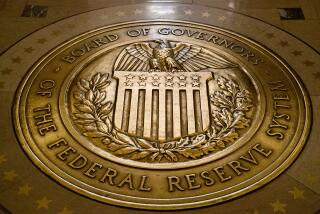Reagan Picks Conable for Top Spot at World Bank
- Share via
WASHINGTON — Barber B. Conable Jr., a respected and pragmatic former Republican congressman from New York, is President Reagan’s choice to be the next head of the World Bank, the White House announced Thursday.
The nomination was quickly welcomed in international financial circles, where it had been rumored for several weeks.
Conable’s supporters said they expect him to accomplish the key tasks of expanding the bank’s role in managing the Third World’s still-critical debt problems and building support for the bank from a skeptical Congress. Current bank President A. W. Clausen, who will finish out his five-year term in July, has his critics on both counts.
The only dissatisfaction with Conable’s appointment came from Republican conservatives in Congress with whom he had formed an uneasy alliance to engineer President Reagan’s first-term tax policy. They had hoped that one of their supply-side colleagues would be named.
20-Year Tenure in House
But those who do business with the World Bank expressed relief that Conable will not be an ideological advocate of Reagan’s economic policies.
Conable’s position was made clear by Michael Barone, writing in the “Almanac of American Politics 1982,” when he said: “The supply-siders . . . regard him as a brake on the train they are trying to set in motion.”
Conable, who served 20 years in the House, retired at the end of 1984 as the top-ranking Republican on the Ways and Means Committee, which has jurisdiction over tax and trade policy. His nomination to the World Bank is expected to win easy confirmation from the bank’s board of directors.
In its announcement of Conable’s nomination, the White House said that he “has demonstrated extensive knowledge of economic and financial matters, both domestic and international.”
Hardly anyone disagreed. “It is gratifying that a man with such keen awareness of international issues should be appointed to this very important post at such a critical time,” said Roy Denman, head of the European Community delegation in Washington.
‘Very Statesmanlike’
C. Fred Bergsten, a top Treasury Department official under President Jimmy Carter and now head of Washington’s Institute for International Economics, called Conable “very statesmanlike, with a deep knowledge of international economic issues. He was the most respected member of the Ways and Means Committee for years on trade issues, tax issues, international financial issues.”
Bergsten recalled that Conable “was always extremely supportive about international development policy whenever I went up to see him. He was very, very constructive in all those ways.”
Richard E. Feinberg, vice president of the Overseas Development Council, a private research group and advocate for Third World nations, was equally pleased.
“He brings a number of advantages: He is interested in trade and international economic issues, and he brings an important political element and could help build support in Congress for bank programs,” said Feinberg, a State Department official during the Carter Administration. “He has the advantage of being a person who will be on good terms with the White House but could also be independent of the White House.”
Feinberg said Clausen failed to win the support not only of the Reagan Administration but also of the bank’s own bureaucracy for his policies. Conable, by contrast, according to one bank staff member who asked not to be identified, is a welcome choice precisely because he is “a good pol.”
After Clausen announced last September that he would leave the bank, the Administration floated several names as possible successors. Federal Reserve Board Chairman Paul A. Volcker quickly indicated that he was not interested, and J. William Middendorf II, the U.S. representative to the European Community, was quietly but firmly vetoed by the Europeans.
Labor Secretary William E. Brock III, who won admiration from the international economic community during his earlier stint as U.S. trade representative, was the most widely mentioned candidate for the World Bank post in recent weeks. But sources said he turned it down.
As a congressman, Conable, 63, was an advocate of balanced budgets, reduced business taxes and free trade. Since his retirement, he has been a professor of government at the University of Rochester in his home congressional district.
More to Read
Sign up for Essential California
The most important California stories and recommendations in your inbox every morning.
You may occasionally receive promotional content from the Los Angeles Times.













